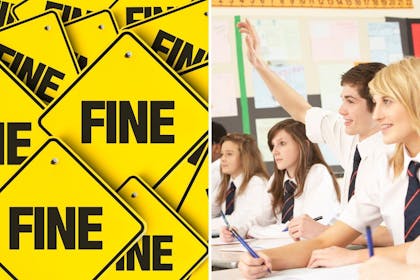Parents warned of 'robust' new school absence rules which could see an increase in fines

The plans are being considered by the Government to improve school attendance following the pandemic.
This page contains affiliate links, which means we may earn a small amount of money if a reader clicks through and makes a purchase. All our articles and reviews are written independently by the Netmums editorial team.
Parents could soon face tougher school absence rules – which could see more fines handed out, as the Government looks to reduce pupil absence rates.
A consultation, called 'How we plan to improve school attendance following the COVID-19 pandemic' has been launched and promises to end the 'postcode lottery' of how attendance is tackled.
Different rules in different areas
The Department for Education (DfE) says currently, different local authorities have 'radically different approaches' to pupil absence. The latest data shows some local authorities issued no fines for school absence in 2020/21, while others issued over 1,500.
It proposes that in future, all schools have the same 'robust' policies detailing how they will support pupils to attend as regularly as possible and sets out how legal intervention including fines, should be used in 'promoting good attendance by local authorities.'
The new standards will make sure interventions such as fines are always used when all other options have been explored.
The consultation comes as the latest school attendance statistics show 99.9% of schools are open, with 87.4% of pupils attending.
Why the Government feels school attendance is so important
The Government says although the pandemic is still causing some 'unavoidable absence' amongst pupils, teachers and staff, lockdowns have highlighted the importance of 'regular face-to-face education', to allow all pupils to fulfil their potential.
The Government also wants to ensure that academies have to follow the same rules as maintained schools in only granting absence from lessons in 'exceptional circumstances.'
The children's commissioner Dame Rachel de Souza will work with some councils to 'review' and 'interrogate' attendance data and step up efforts to support children who are persistently absent from school.
The DfE is also calling for schools to be involved in a new data trial, which will involve data being gathered directly from school registers – something the children's commissioner had called for.
The DfE has launched a consultation on:
- Requiring schools to have an attendance policy
- A national framework on fixed penalty notices for absence and other legal intervention
- Bringing the rules for granting leaves of absence in academies in line with other state-funded schools
- Introducing statutory guidance on the expectations on schools, trusts and governing bodies on attendance management and improvement
- Introducing statutory guidance on the expectations of local authority attendance services
Proposals for new rules on fines for parents
The consultation says that a new national framework for when fines should be considered could include:
- A number of sessions of unauthorised absence in a fixed period.
- An incidence of unauthorised leave of absence in term time.
- Any sessions of unauthorised absence immediately following a period of authorised leave in term time.
- A number of occurrences of lateness.
- An incidence of being in a public place during school hours when excluded (with reasonable exceptions).
What will schools' attendance policies be expected to include?
The government's consultation document says that the plan to require schools to have an attendance policy is 'not for the sake of having a document, but so that schools think strategically about their attendance efforts and ensure that staff, pupils and parents all understand the importance of regular attendance.'
Under the plans, school policies on attendance would be have to include the following:
- How the school sets clear expectations for parents and pupils
- The day-to-day processes around attendance management that parents can expect (for example, phoning the parent on the first day of an unauthorised absence)
- How the school is promoting good attendance (for example, through regular monitoring)
- The named member(s) of staff responsible for attendance
- The 'specific strategies' the school is using to address persistent absence
- The 'clear escalation route in the event of a pupil's failure to attend regularly
Education secretary Nadhim Zahawi said the proposals would end a 'postcode lottery' on how attendance is managed in different schools and in different areas of the country.
Mr Zahawi said: 'I want every single child to have the opportunity to fulfil their potential, which only time in school with this country's world-class teachers can bring.
'That's why I will continue to give schools the tools they need to keep pupils in class, whether that's support with ventilation, testing or vaccinations, which all remain so vital.
'And as we transition from pandemic to endemic, it makes me even more determined to fight for children to be in school every day they possibly can be.'
He continued: 'Absence due to COVID-19 is unavoidable, but there are other reasons children miss out on school, too.'
The attendance consultation is running until 11.45pm on 28 February.
Is your your child finding maths hard going? You need to invest in these clever Mathslink cubes that help little ones get to grips with adding, subtraction and other number skills. See more details here at Amazon.
Collins have a great range of homeschooling books to help your kids catch-up at home. From spelling workbooks to maths guides, you can browse the whole range here at Amazon. Prices start at just over £2.
Should parents be fined when their children are absent from school? Have your say in our chat thread below.
Related content
What to do when your child refuses to go to school
CHAT: Is it fair to fine parents over pupils' absence?
Primary school children left socially 'two years behind'


